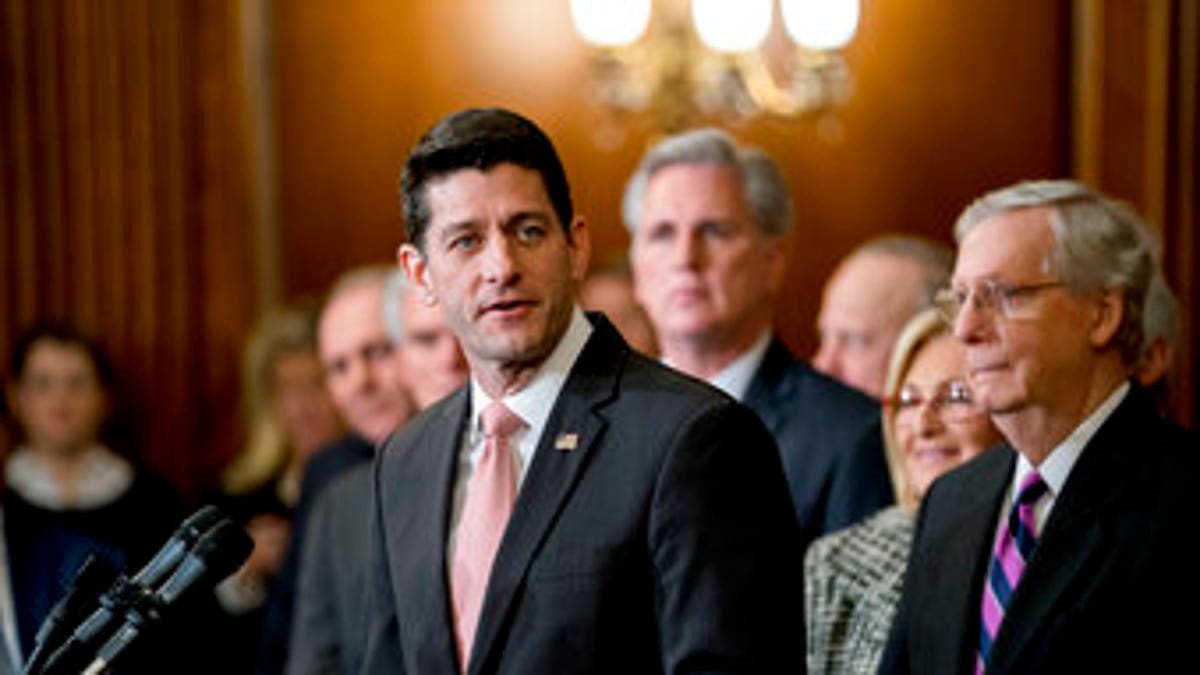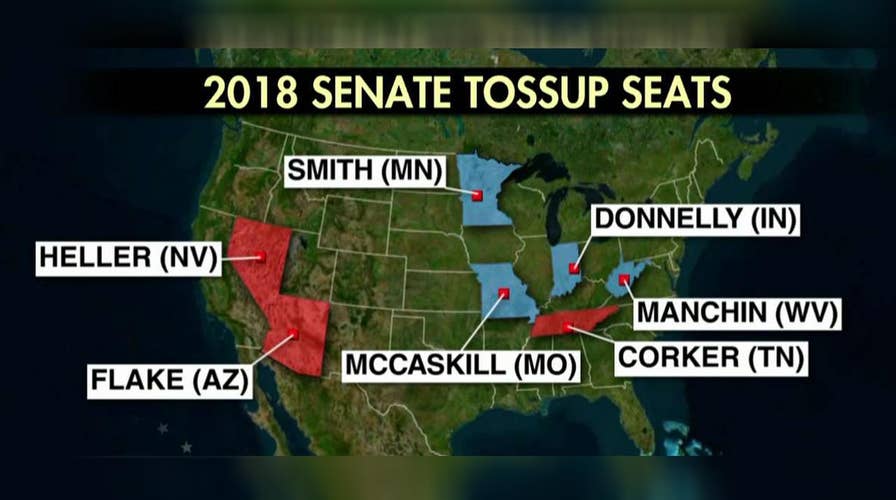'Fox News Sunday' panel looks ahead to 2018 midterms
How will retirements and resignations impact the balance of power on Capitol Hill?
Football fans are often confounded when teams win the coin toss but defer to the second half.
Some teams win the toss and elect to receive the opening kickoff, preferring to go on offense right away. But other teams that win the toss would rather kick off to begin the game -- and then get the ball following halftime.
This is a strategy. Some teams would rather get the ball at the start of the third quarter, maximizing their second half possession opportunities.
We’re now at halftime in the 115th Congress. Congressional Democrats may be in the minority, but they positioned themselves to defer at the beginning of the game, receiving the kickoff to start the second session of this Congress.
Republicans were enraptured before Christmas about passing tax reform. But GOPers were divided about how to fund the government, facing a holiday deadline. They didn’t want Democrats to marry a DACA fix to an average government funding bill. Some Republicans wanted a long-term boost for defense spending. There were fights over children’s health care, the stabilization of health care markets and disaster assistance. They never addressed the debt ceiling.
Some Republicans implored their coaching staff to run an untimed play at the end of the first half. A “Stanford Band” maneuver, loping all over the field, flipping laterals to linemen, keeping Congress in session between Christmas and New Year’s to tackle nettlesome fiscal issues. But in the end, the GOP simply took a knee and ran out the clock. They renewed all government funding on a temporary basis through January 19 and jogged to the locker room.

Speaker of the House Paul Ryan, R-Wis., left, joined by from left, House Majority Leader Kevin McCarthy of Calif., House Budget Committee Chair Diane Black, R-Tenn., and Senate Majority Leader Mitch McConnell of Ky., as he praises the Republican tax bill at an enrollment ceremony at the Capitol in Washington on Dec. 21, 2017. ((AP Photo/Andrew Harnik))
Well, halftime is over. The crowd is back in its seats. The marching band packed up its clarinets and euphoniums. The kicking tee is on the field.
And Democrats get the ball.
Democrats knew they’d have more leverage after the holidays. If Republicans wanted to run some crazy double-reverse, flea-flicker gadget play and screw up their victory on tax reform with a government shutdown, have at it. Democrats always knew they’d receive the second half kickoff and could dictate terms of the game, forcing the GOP defense onto the field.
It all begins Wednesday as House Speaker Paul Ryan, R-Wis., Senate Majority Leader Mitch McConnell, R-Ky., House Minority Leader Nancy Pelosi, D-Calif., Senate Minority Leader Chuck Schumer, D-N.Y., Budget Director Mick Mulvaney and White House Director of Legislative Affairs Marc Short all huddle at the Capitol to hash out the big issues.
The subjects are contentious. They’re challenging. And they take time.
Time is something lawmakers and the Trump administration lack. The government is only funded through January 19. The Senate returns to session Wednesday. But the House doesn’t get back to work until January 8.
We’ll see if anyone drew up a special play over the holiday recess.
Passage of the tax bill -- regardless of whether one likes the policy or not -- reflects stability. That’s something President Trump and congressional Republicans desperately needed. Voters don’t like chaos and drama. The Trump presidency seemed to revolve in a permanent state of pandemonium during 2017. Any continuation of that maelstrom is bad news for congressional Republicans facing midterm elections this November. The generic ballot (a study evaluating whether voters favor a generic Democratic or Republican candidate on the ballot) now favors Democrats by a staggering 13 points. Big tax bills don’t always guarantee electoral success. After the Reagan tax cuts in 1981, Democrats picked up 26 House seats in the 1982 midterm elections. Congress approved bipartisan tax reform in 1986. Just weeks later, Democrats flipped control of the Senate, winning eight seats.
So Republicans know they have to keep an even keel over the next few months.
By the same token, they must try to appeal to conservatives and the GOP base. That involves boosting the military, constructing a border wall and reducing overall spending. But Republicans seem scattered. That’s why there was no deal before Christmas. If Republicans can’t get their act together on their side of the aisle, they’ll have to turn to Democrats just to help avert a government shutdown.
Republicans now only hold 51 seats in a narrowly divided Senate. This is one of the reasons why Democrats are poised to receive the second half kickoff and control the ball.
That comes at a cost. Democrats will demand a permanent DACA fix. Democrats and many Republicans (mostly in the Senate) would like to restore health care cost-sharing reductions (CSRs) for the poor which President Trump slashed in October. And budget-conscious conservatives (few of whom raised hackles at potential deficit spending incurred by the tax bill) are worried about $133 billion in additional spending prompted by hurricanes and wildfires. Congress already approved two bills totaling $52 billion for the hurricanes. The House OK’d $81 billion in disaster relief just before the break -- but the Senate didn’t touch the package. The Senate aims to tweak the measure and send it back to the House in the coming weeks.
Democrats understand how fractured Republicans can be. They also know it takes 60 votes to sidestep a filibuster in the Senate. The Senate swears-in Sen.-elect Doug Jones, D-Ala., Wednesday. That means Republicans now only hold 51 seats in a narrowly divided Senate. This is one of the reasons why Democrats are poised to receive the second half kickoff and control the ball. Republicans will likely have to cede some of their demands to Democrats just to avoid a government shutdown. Otherwise, chaos and pandemonium ensue. Such upheaval may work for President Trump. But it doesn’t work on Capitol Hill. Trump may have to accept many of the Democrats’ demands.
The president, Ryan and McConnell head to Camp David this weekend to discuss the 2018 agenda. This is the equivalent of a team burning one of its three timeouts early in the half. Ryan wants to push entitlement reform. That could help address deficit spending. But talk about curbing Medicare, Medicaid and Social Security may not be the wisest play call in an election year. President Trump wants to push a major infrastructure package. However, that may also involve deep deficit spending. Mr. Trump is energized by the tax bill victory. Fox is told that GOP leaders hope to use the conclave to temper the president’s expectations in 2018.
So Democrats get the ball to start the second half.
The best Republicans can hope for is try to force a fumble.





